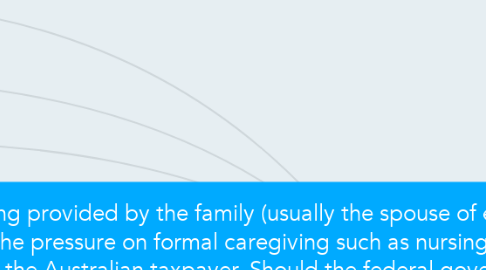Caregiving provided by the family (usually the spouse of elderly individuals with dementias), decreases the pressure on formal caregiving such as nursing homes and hospitals and lessens the impact on the Australian taxpayer. Should the federal government assist informal caregivers to relieve some of their financial and emotional burden, or does the responsibility still rest with the individual?
by Melanie Leaver

1. emotionally stressed, carers health will be affected when burdened with such responsibility
2. family choice to have informal caregiver to support and comfort the individual in need of care
3. cost of living vs being in hospital
4. carer may need to give up working, financially viable to do so?
5. individual caring may experience negatives towards health in all aspects
6. dealing with symptoms that the person in need of care have
7. burden assistance, help in the form of formal caregiving for patient or help directly for informal caregiver to cope with caregiving
8. relief in nursing homes when care can be given at home, short on beds lessens care quality that can be given to all, spread nurses or formal carers across more patients
9. financial burden, affordability of medical attention not in every ones reach


